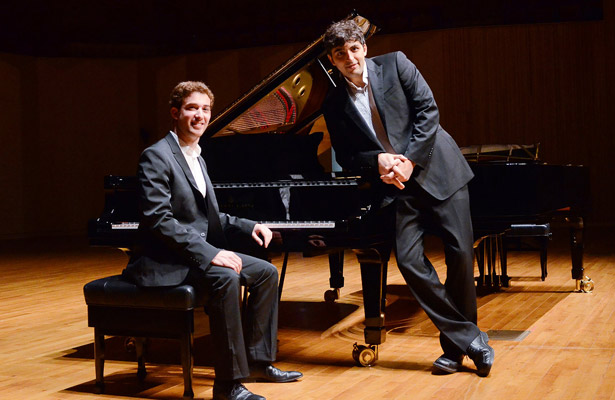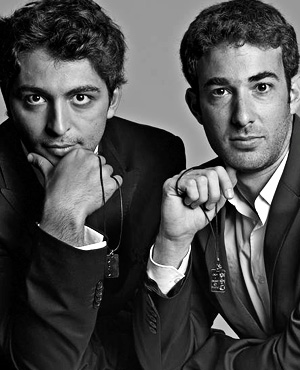Duo Amal:Bishara Haroni & Yaron Kohlberg
The duo's name, 'Amal', means hope in Arabic and is reflecting the idea behind their playing together as an Israeli and a Palestinian. They aspire to achieve top musical level together with this idea, leading to feedbacks also outside the music world.
The International concert pianists, Yaron Kohlberg (winner of the Cleveland International Competition) and Bishara Haroni, met in Jerusalem. At Yaron's suggestion, they joined forces in 2008 for a concert at the New Opera House in Oslo. Following the great success of the concert and the enthusiastic response of the audience, which included many musicians and diplomats, Yaron and Bishara decided to form a permanent Israeli-Palestinian piano duo. They performed in Europe, USA, Asia, and also toured the Far East to critical acclaim. Future engagements include recitals at the Wiener Konzerthaus, The Beijing concert Hall, the Beethoven festival in Bonn, Auditorio San Pedro in Monterrey, and at various venues in Germany, France, Belgium, Finland, India, China, the United States and Israel. They have a large and varied repertoire ranging from the baroque to the modern period, and including works by Israeli and Palestinian composers. The duo aims to show that music-making at the highest level can transcend political and national differences. On the personal level, Bishara and Yaron have become close friends.

Yaron Kohlberg, born in 1983, is the winner of many prestigious international prizes, including the second prize in the 2007 Cleveland International Piano Competition and first prizes in the Shostakovich Competition in Hanover and the Parnassos International Competition in Monterrey. Venues in which he performed include Carnegie Hall in New York, the Kremlin in Moscow, the Kennedy Center in Washington D.C., the Beethovenhalle in Bonn, Severance Hall in Cleveland, Salle Cortot and Les Invalides in Paris, the United Nations hall in Geneva and Bellas Artes in Mexico City. He has appeared as soloist with major orchestras around the world and with all the leading orchestras in Israel including the Israel Philharmonic Orchestra, the Jerusalem and Haifa Symphony Orchestras, the Camerata, and the Raanana Symphonette. He performs regularly in chamber music concerts with the American duo Parnas and with Danish cellist Toke Moldrup. He has collaborated with leading Israeli chamber music groups including the Ariel String Quartet, Percadu, the Quartet for Contemporary Music and the Carmel Quartet. His piano teachers are Luise Yoffe, Eitan Globerson and Arie Vardi.
Bishara Haroni, born in 1983, concertizes regularly as a soloist and chamber musician in famous venues, and collaborates with major orchestras, conductors and instrumentalists. As a concert soloist, he has enjoyed associations with major orchestras in Europe, the United States, Asia and the Middle East, and has recently performed as a soloist with the London Philharmonic under the baton of Maestro Lorin Maazel, with a chamber music ensemble with Maestro Daniel Barenboim and with the Israel Philharmonic under the baton of Maestro Zubin Mehta. Haroni has given recitals in several major halls in the world including the Carnegie Hall in New York. He performs frequently in international chamber music festivals, and played concerts with Guy Braunstein and Daishin Kashimoto, concertmasters of the Berlin Philharmonic Orchestra. This season Haroni has been invited by Sir Simon Rattle to perform with the first players of the Berlin Philharmonic Orchestra in a chamber music series. He will be also touring as a soloist with Maestro Daniel Barenboim in Salzburg festival and as a chamber musician at the BBC-Proms in the UK. His piano teachers are Esther Balasha, Eitan Globerson and Arie Vardi.
.A documentary film is being made about the duo these days, and they have sponsors for a CD recording at RBB Deutschland. Different companies and private sponsors, among them from Jewish Communities and peace foundations, have shown their interest in supporting the duo.
Back to top |
Repertoire
Two pianos:
W. A. Mozart: Sonata in D major K. 448
S. Rachmaninov: Suite No. 1 Op. 5
D. Shostakovich: Concertino Op. 94
C. Franck: Prelude, Fugue and Variations
D. Milhaud: Scaramouche
I. Stravinsky: Petrushka
S. Prokofiev/arr. Rikuya Terashima:
SYMPHONY NO. 1 IN D, OP. 25, "CLASSICAL" (ARR. FOR TWO PIANOS)
M. Ravel: La Valse
A. Dorman: Israeli composer
S.O. Tameemi: Palestinian composer
Four hands:
G. Fauré: Dolly Suite
Wissam Jibran:
W. A. Mozart: Sonatas in C major and in D major
F. Schubert: Phantasy in F minor
Ronen Shapira: He is the one
I. Stravinsky: Petrushka
J. Brahms: Hungarian Dances
C. Debussy: Petite Suite for 4 hands
M. Ravel: Ma Mère loye
**S. Rachmaninov: Valse and Romance for piano, six hands
Double piano concertos:
F. Poulenc: Concerto for Two Pianos in D minor
W. A. Mozart: Concerto for 2 Pianos in E flat major, K 365
**J. S. Bach: Concerto for 3 pianos in D minor
Two pianos with other instruments:
B. Bartók: Sonata for two pianos and Percussion
R. Schumann: Andante and Variations for two pianos, two celli and horn, Op. 46
J. S. Bach: Concerto in C major for two pianos and string quartet, BWV 1061
Back to top |
Reviews
October 29, 2012
The audience was bound to be well disposed toward the young pianists who comprise Duo Amal, thanks to their story, known across the world and most recently told by the Australian Jewish News.
For the past four years, brilliant Israeli pianist Yaron Kohlberg and Arab piano virtuoso Bishara Haroni have performed together as Duo Amal since meeting in Jerusalem and joining forces in 2008 for a well-received concert in Oslo.
International award-winner Kohlberg was born in Jerusalem in 1983 and has appeared as a soloist with major orchestras around the world, including the Israel Philharmonic. So has Haroni, who was born in the northern Israeli town of Nazareth and learned piano at the age of 12 in Haifa, followed by studies in Jerusalem, then Germany.
Both – not surprisingly – have performed with West Eastern Divan Orchestra, which co-founder Daniel Barenboim describes as ‘a project against ignorance’. Its aim is to promote understanding between Israelis, Palestinians and other young musicians from the region simply by having them play music together.
Duo Amal is clearly like-minded, with the two pianists close friends, something that translates into their performance: synchronised, empathetic and at times, with an edge of humour. It’s important to say that, quite apart from the warm, fuzzy feelings generated by their history, they deserved the enthusiastic applause they were given by this Melbourne Festival audience.
First up, with no preamble, was Schubert’s Fantasia in F minor, surely one of the most beautiful works in the piano duet repertoire. Its lyrical sweetness may make it seem easy, but the piano octaves and interweaving parts can be a trap for lesser musicians. Kohlberg and Haroni found the power and showiness necessary for the development of the theme, before the quiet ending, a reprise of the theme.
Duo Amal’s perfect synchronicity was certainly needed for the next work, by contemporary Israeli composer Avner Dorman.Karsilama added the inspiration of a Greek dance to the cultural mix as the pianists (now seated at their own instruments) used eye contact and brilliant technique for the fast-moving piece right through to the tarantella-like finish.
The pianists stayed across the room from each other for the first of two major works: Prokofiev’s Symphony No.1 (‘Classical’). Arranged by Rikuya Terashima, the work presented a huge challenge to the two pianists who, of course, had to do the work intended for a full orchestra!
The first movement contrasted a sparkling pace with a more delicate subject, and in the second settled to a larghetto, with one piano appearing to have the melody (played in octaves) while the other ‘accompanied’. One result was that the delicacy of the harmonisation could be more easily heard and appreciated.
A well-known Gavotte then gave renewed resonance to the two-piano work, with the pianists appearing to enjoy the somewhat cheeky interchange. The Finale was very fast, but Kohlberg and Haroni stayed together and echoed each other, as if engaged in enjoyable battle. Loud applause showed the audience enjoyed it too.
After interval came Amal (‘Hope’) a piece commissioned by the Duo from Palestinian-Israeli composer Samir Odeh-Tamimi. In contrast to the more melodic works in the program Amal employed techniques such as playing the piano strings directly with the hand or arm, to create sounds of conflict, contrasting with introspection.
Technically demanding, the piece showed yet another facet of Duo Amal’s mastery of contemporary works – but it was something of a relief when the pianists turned next to Rachmaninov. His suite no.1 for two pianos, op.5 Fantasie-Tableaux,is in four movements, each of them creating an image, in the way of Romantic program music.
The opening Barcarolle was reminiscent of the piano concertos, being resonant and rich in melody and harmony, with almost ethereal beauty in the upper register. La nuit …L’amour had the melody gently articulated and soon surrounded by harmony in the broken chords. Les larmes was gentle but not without technical challenge.
With its loud opening a shock, Easter developed into a huge mass of sound that was pure Rachmaninov. It was all too short – rather like the concert itself, as far as listeners were concerned. But Duo Amal obliged with two encores that were exceptionally well received.
R. Denbrook & R. Trott,
BerNews
February 14, 2013
They set a fire in the hearts, minds, and bellies of all those in attendance at the Earl Cameron Theatre, City Hall that evening.
Bishara Haroni and Yaron Kohlberg of the piano duo, Duo Amal, certainly lived up to their name, as they demonstrated what music can achieve when people come together to make it, with complete and utter generosity for one another.
Playing not just for themselves, but for the audience, the duo took everyone through a varied, challenging, and quirk-filled program of compositions, who’s composers in one way or another challenged the form, which in turn gave these exceptionally talented pianists the room to flex their inspiring sense of musicality.
Wasting no time and plunging everyone into the proverbial deep-end, the duo began on the same piano with a soulful and dynamic rendition of Schubert’s Fantasy For Piano, Four Hands, in F minor.
Beginning with a haunting tune, the pair played the piece as if they were having a conversation about the bright highs and deep lows of life, one minute soaring on the keys, the next minute returning to the dark melody that began the piece, playing with such skilled conviction to tell any number of stories.
Next was the piece Karsilama, commissioned by the duo from composer Avner Dorman and completed in 2012.
Grossly rhythmic and entirely tiring, the pair played at their own instruments this time, sharing the melody at different points, and somehow finding their way through a meandering and wonderfully chaotic piece, obviously enjoying the challenge and story that the ambitious and unique piece presented.
The first half was brought to a close with Prokofiev’s Classical Symphony Op 25, described as a neoclassical piece and composed in 1917, the duo certainly found themselves at home in the harmonically progressive composition, definitely leaving the audience in sweet anticipation for the second half.
Opening the final half of the evening was another piece commissioned by the duo, this time by composer Samir Odde Tamimi called Amal.
An abstract piece begun with Mr. Haroni plucking the strings of the piano, and much of it focusing on the lower registers of the piano though accentuated by harsh beautiful highs, the duo allowed the audience to experience the depth and profundity of their musical range with an oddly dynamic piece that stilled the theatre completely, allowing a beautiful silence to resonate through the space once it was complete.
As Mr. Kohlberg said, there was a reason the piece was played in the second half and not the first, as he explained it was not uncommon for audience members to leave after it was played, if it was played during the first half.
Finally the inspiring pair rounded out the programme with Rachmaninov’s Fantaisie – Tableaux for Two pianos, the most familiarly “Classical” of the all the pieces, though not in anyway less challenging or insightful.
The pair finished the recital by allowing a piece that required space to evolve, to do just that; their sensitive and generous playing allowing the piece to breathe and come to life with all of the beautiful subtleties the composition had to offer.
Of course, they had to come out and bow four times, and of course, there was an encore, returning to the light and energetic yet still profound material used in the first half of the evening, as if leaving the audience with a small nugget of wisdom for them to make sense of for themselves.
With much love for each other developed through their shared love of music, the pair took the audience through an utterly unpretentious and thoroughly passionate evening of piano playing that served as an affirmation, in many ways, of what can be achieved when differences of any sort are set aside and a commitment to the joyful realization of a common good is made the priority.
|
Links
Official Web Site: www.duo-amal.com
Back to top |
|


